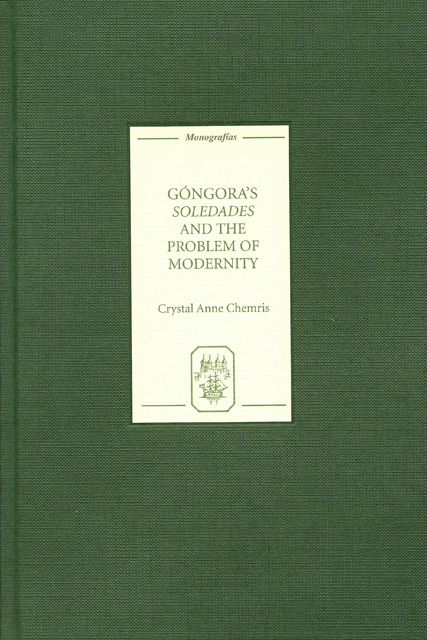Book contents
- Frontmatter
- Contents
- Dedication
- Foreword
- Acknowledgments
- Preface
- Introduction: Renaissance and Solitude
- 1 Crisis and Form
- 2 Violence, Eros and Lyric Emotion
- 3 Self and World: The Crisis of Perception in the Soledades
- 4 Time, Space and Apocalypse: The Falconry Scene as Disruption of Prophecy
- 5 Góngora and the Modern: “New Poetry”?
- Works Cited
- Index
3 - Self and World: The Crisis of Perception in the Soledades
Published online by Cambridge University Press: 03 May 2023
- Frontmatter
- Contents
- Dedication
- Foreword
- Acknowledgments
- Preface
- Introduction: Renaissance and Solitude
- 1 Crisis and Form
- 2 Violence, Eros and Lyric Emotion
- 3 Self and World: The Crisis of Perception in the Soledades
- 4 Time, Space and Apocalypse: The Falconry Scene as Disruption of Prophecy
- 5 Góngora and the Modern: “New Poetry”?
- Works Cited
- Index
Summary
no de otra suerte el Alma, que asombrada de la vista quedó de objeto tanto, la atención recogió, que derramada en diversidad tanta, que aun no sabía recobrarse a sí misma del espanto que portentoso había su discurso calmado, permitiéndole apenas de un concepto confuso el informe embrïón que, mal formado, inordinado caos retrataba de confusas especies que abrazaba —sin orden avenidas, sin orden separadas, que cuanto más se implican combinadas tanto más se disuelven desunidas, de diversidad llenas—, ciñendo con violencia lo difuso de objeto tanto, a tan pequeño vaso (aun al más bajo, aun al menor, escaso).
Sor Juana Inés de la Cruz, Primero sueñoThe critique of sexual violence in the Soledades relates to a more encompassing critique of the process of epistemological and aesthetic mediation. If one accepts Bradley Nelson's observation that the peregrino constructs his relationship to reality in an atmosphere of contingency, the journey through the labyrinth of the poem can be seen as a persistent engagement with the cracks in the symbolic order (“Góngora's Soledades” 611). These tensions arise, again, in the breakdown of the Aristotelian–Scholastic, as well as Platonic, views of the world and the “epistemic and moral vacuum” (to use Spadaccini and Estudillo's term) left in its wake (xxx). The textual manifestation of this hiatus, which we have studied in the contradictory formal elaboration of the poem as well as in the relationship between self and other can also be observed in the relationship between the self and the phenomenal world, as a crisis in perception.
One point of departure from which to examine this crisis of perception in the Soledades is Martin Jay's discussion of competing visual subcultures in the “modern scopic regime” which begins with Renaissance notions of perspective (179). Jay identifies three visual subcultures of modernity: (1) “Cartesian perspectivalism,” which he calls the “monocular” view, identified with both the absolutist gaze and the scientific worldview; (2) “Baconian empiricism,” which he associates with the private space of bourgeois prosperity in the Dutch “art of describing”; and (3) the Baroque visual experience. Jay, citing the work of Christine Buci-Glucksmann, identifies “the explosive power of baroque vision,” with its “dazzling, disorienting, ecstatic surplus of images,” as “the most significant alternative to the hegemonic visual style we have called Cartesian perspectivalism” (187–88).
- Type
- Chapter
- Information
- Góngora's Soledades and the Problem of Modernity , pp. 72 - 86Publisher: Boydell & BrewerPrint publication year: 2007



